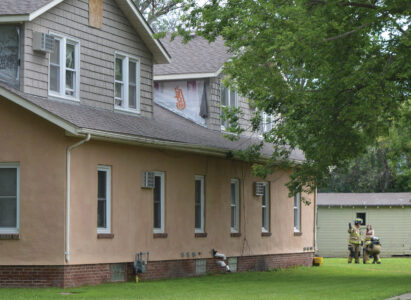Dahms pleased with Senate bills, Swedzinski blasts House climate measure
ST. PAUL — Sen. Gary Dahms, R-Redwood Falls, and Rep. Chris Swedzinski, R-Ghent, reported on Minnesota Legislature actions this past week. While Dahms was upbeat on a multiple Senate bills dealing with education, housing and the environment, Swedzinski was critical of a climate and energy bill pushed by Democrats in the House.
Both the House and Senate are busy taking up key issues down the final stretch as the May 17 adjournment looms.
Omnibus education bill
The Minnesota Senate approved a bipartisan bill Thursday that funds K-12 schools and transforms the way the state delivers education. The bill emphasizes improving student performance, literacy, and mental health, and empowering parents.
“This bill focuses on empowering parents and improving outcomes for all kids across this state,” Dahms said. “Senate Republicans have made sure schools are fully funded every year we’ve had the majority, and this year will be no different. Between state resources and the influx of federal funding, total education spending will once again surpass record levels.”
Dahms said schools will receive a significant boost in funding of nearly $3.5 billion from combined state and federal resources. Total state education aid will reach a record of $20.6 billion for the upcoming two school years under the Republican proposal — approximately 42% of the state’s general fund budget.
When combined with local levies, schools will have more than $29 billion in revenue for the next budget cycle.
Key provisions of the bill include:
• Providing $54 million for safe schools funding over the next two budget cycles.
• Providing $23 million in the 2022 school year for referendum equalization which allows fair school funding for districts with less property wealth.
• Prohibiting “lunch shaming” or other penalties when payment for school means is overdue.
• Creating Education Savings Accounts (ESAs) to empower parents with more flexibility and control over their children’s education.
• Expanding the successful LETRS teacher training program.
• Providing pathways to get more teachers of color into the classrooms.
• Prioritizing mental health support by addressing the effects of social media and screen time overuse and misuse on student mental health, youth counseling at the elementary school level, and funding for suicide prevention training for teachers.
• Supporting kids, families, and teachers as they attempt to recover from learning loss suffered during COVID-19-related school closures.
The bill now awaits action by the Minnesota House of Representatives.
Housing affordability
The Senate passed the $115 million omnibus Housing budget bill on Wednesday.
“Owning your own home has been proven to lead to more successful outcomes including kids doing better in school, better mental and physical health, more community involvement, and greater generational wealth,” Dahms said. “I’m excited this bipartisan legislation will help to pave the way for homeownership to many Minnesotans by removing barriers and encouraging more diversity in the housing stock.”
This legislation also includes an eviction moratorium phase out passed earlier in the session. An eviction moratorium was originally established by Gov. Walz’s executive order which became effective on March 24, 2020. According to Dahms, the change would restore property rights for owners while leaving vital protections in place for those who most need it.
Other key provisions included in the legislation are:
• Funding to the Workforce Homeownership Program to provide one-time grants for the development of workforce and affordable homeownership projects across Minnesota.
• An increase to the Home Ownership Education, Counseling, and Training (HECAT) Program, helping to prioritize decreasing the homeownership gap between white households and households of color.
• Allows federally recognized American Indian tribes in Minnesota and tribal housing corporations to be eligible for housing grants in a natural disaster area.
• Requires the Minnesota Housing Finance Agency to consider how quickly a project can be constructed when scoring projects competing for funds.
• Establishes that cities may not require a Planned Unit Development (PUD) if the builder’s residential development already complies with existing city zoning requirements and bars PUDs from including aesthetic mandates which are otherwise prohibited by law. Simplifying and making it easier to build homes will help increase the supply and lower the costs of homes in our state.
• Bans municipalities from enacting rent control.
The bill awaits action by the House.
Environment and legacy bills
The comprehensive Omnibus Environment and Natural Resources bill emphasizes funding for critical environment needs, prioritizes recycling and waste management, targets Aquatic Invasive Species (AIS), and supports groundwater preservation. The legislation also helps Minnesota’s tourism industry and increases funding for the state’s parks and trails.
The legislation modifies several wasteful regulations and removes the authority of the Minnesota Pollution Control Agency (MPCA) to enact the California Emission Standards without legislative approval.
“We want all Minnesotans to have access to an environment that is clean, accessible, safe, and preserved for generations to come,” Dahms said. “Our budget supports getting people out on our lakes, boosting our great tourism industry, and investing in our parks and trails that so many folks have relied on for entertainment over this past year.”
Also included in the bill:
• The reuse and redevelopment of closed landfills for energy generation including solar energy.
• Implementation of a mattress recycling program.
• Creation of the Minnesota River Basin Water Storage Program to protect and preserve groundwater.
• Walleye limit reduction and minnow importation.
The Omnibus Legacy Finance bill provides appropriations for preserving, protecting, and maintaining the state’s natural resources. This bill allocates $645.6 million to the Outdoor Heritage Fund, the Clean Water Fund, the Parks and Trails Fund, and the Arts and Cultural Heritage Fund.
“We are surrounded by incredible beauty across Minnesota, and we must continue to protect our lands and habitats for future generations,” Dahms said.
Other notable provisions include:
• Accepts the $128 million recommendation from the Lessard-Sams Outdoor Heritage Fund and the recommendation of $110.6 million for the Parks and Trails Fund.
• The Clean Water Fund will receive $256.7 million. This includes funding for the Soil and Water Conservation Districts, the Conservation Reserve Enhancement Program (CREP), and the Public Facilities Authority (PFA).
• Appropriates key funding to the Department of Agriculture, Department of Natural Resources, and the University of Minnesota to protect, maintain, and invest in our state’s water systems.
• Allocates $149.7 million for the Arts and Cultural Heritage Fund of which 47% will be dedicated to the State Arts Board. It also allocates money to the Minnesota Historical Society and the Humanities Center.
Both bills now await action by the Minnesota House of Representatives.
Climate and energy
Swedzinski labeled the House Commerce, Climate and Energy Finance bill as too costly. The bill passed the House on a 70-64 party-line vote. Swedzinski is the Republican lead on the House Climate and Energy Finance and Policy Committee.
“Minnesotans deserve affordable, reliable energy achieved by an all-of-the-above approach that once helped our state enjoy some of the nation’s cheapest energy rates,” Swedzinski said. “Radical liberal policies now have made our state’s energy rates among the country’s most expensive. This House Democrat bill goes even further in the wrong direction by adding more costly mandates and prescriptive bureaucracy while limiting our energy options.”
Dahms attacked the MPCA for circumventing the Legislature in adopting California emission and car standards. Dahm s said the proposed change will increase costs, drive down supply, and make life less affordable for many Minnesotans, particularly lower-income and rural residents.



